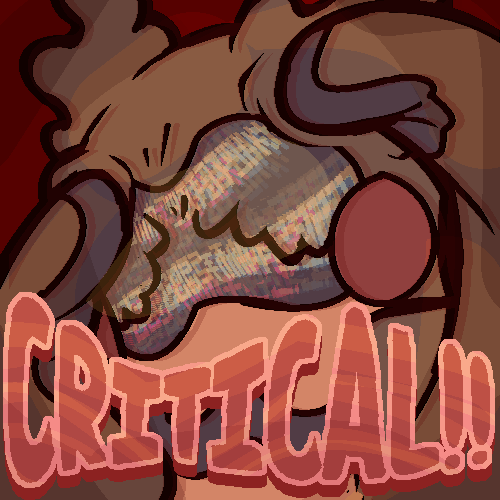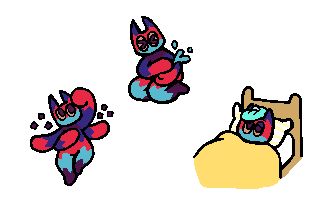Table of Contents
TCP Health and Injury
A drone/flour sack/weighted blanket type hybrid taking psychic damage from an unseen trojan virus type.
All TCPs have a Health stat, also known as their HP, which is a measure of how close or far a TCP is from death. However, this stat is independent of the TCP's physical condition, also known as their status. Much like other traits of TCPs, the way that TCPs manage their health and status may vary depending on their typings, conditions, modifiers, and anomalies.
Health Scaling
TCPs have a health value ranging from 0 to 8, labeled according to these values:
- PERFECT (8)
- FANTASTIC (7)
- GREAT (6)
- GOOD (5)
- OKAY (4)
- POOR (3)
- HURTING (2)
- SUFFERING (1)
- CRITICAL (>0)
- ZERO (0)
TCPs can have a decimal amount of health, to the nearest 0.25, but to those aware of the health value of the TCP, it will always round down. For example, a TCP with 5.75 health will see their own health as GOOD (5), and so will anyone else that can see their health.
The max health of a given typing tends to correlate with the TCP's composition and category. A basic type TCP has GREAT (6) health, which is about average health. Weapon types tend to have lower than average health, while abstract types tend to have higher than average health. Otherwise, one would expect, for example, an iron type to have higher health (PERFECT) than a blanket type (GOOD).
Falling to ZERO (0) health kills a TCP. This is the only condition to kill a TCP outside of TCP sessions. In other words, no amount of physical injury can kill a TCP as long as their health remains above 0.
Losing Health
A party type demonstrates ways that TCPs can lose health.
TCPs can lose health in a variety of ways, such as ability use, injury, illness, poison, psychic damage, or bleeding. This article will use “damage” in the context of TCPs to specifically mean losing health.
Most TCPs with active abilities will lose some quantity of health (at least 0.25) upon using their ability, even if they are decimal amounts (and thus not immediately apparent unless it is used extensively). TCPs with passive abilities, like creature types, usually do not lose health upon exerting them. Abstract types will always sacrifice 1 health upon ascending.
Pain, strain, or permanent damage (such as scars) do not inflict damage on the TCP. In fact, since TCPs' health and status do not directly relate to each other, it's possible for a TCP to be more or less damaged than they look. A TCP could be covered in injuries and still be in good health, though if the TCP is bleeding fluid, this tends to damage them over time.
Most weapon types, and possibly other types that are capable of creating objects inside their own body, may suffer a permanent maximum health penalty upon using their ability to do so.
Gaining Health
Food type TCPs are capable of regenerating their health by resting. Otherwise, almost all other TCP types are incapable of regenerating health on their own unless they have a special trait or ability.
Most food types will restore health upon being consumed (with fairly obvious exceptions), and may accelerate bodily regeneration as well. They do not necessarily offer pain relief depending on the typing, consumer, and nature of damage, but a TCP may feel comfort from food consumption.
There are a rare few non-food type abilities that can heal TCPs. For example, a doctor type accelerates both health and physical recovery around them, and cannibalism types can restore health by consuming non-food TCPs.
Physical Recovery
Most TCPs can recover from injuries with rest and care, separate from their health. TCPs with standard or living, organic skin (such as plant matter) can regenerate from physical damage, and any fluid can replenish itself over time. However, completely solid, fluid-less TCPs and TCPs made of artificial or dead material (such as a driftwood type) cannot regenerate this material.
TCPs take much less time to recover from physical injuries compared to complexes, with simple injuries such as cuts taking about a day of rest. In addition to healing very fast, TCPs can have parts of their body surgically reattached after removal if not too much time has passed and the part has remained in relatively close proximity. Once again, this does not apply to TCPs that cannot physically recover their solid material.
If a hollow part without fluid is attached to a TCP, their natural fluid generation will eventually fill it, which takes considerable recovery.
Health Assessment / Awareness
In most situations, TCPs are not directly aware of the health of another TCP without special equipment.
If multiple TCPs are in a combat situation, they will be aware of the health value of all participants (rounded down). The TCP does not need to be physically fighting anyone to have this awareness; a bystander (or medic) that is “involved” in the fight will know the others' health.
Food types will learn the health of TCPs in close proximity that consume their food material. If a TCP uses an ability with a health cost, nearby TCPs will know their new health value.
Non-TCPs (e.g. complexes) do not have the ability to detect TCP health values without gear, even if the TCP uses abilities. This includes faux TCPs (which resemble TCPs, but are not actually TCPs.)
Examples
- A basic type TCP has full health, GREAT (6). They cut themselves on something sharp by accident and drop to GOOD (5).
- The basic type bleeds for long enough to drop to OKAY (4) health before seeking rest and treatment. They recover fully from their injury after about a day, but remain at OKAY (4) health. They may or may not develop a scar.
- The basic type eats part of a yummy yummy apple type and goes back to GOOD (5) health.
- A lighter type receives a small puncture hole that causes them to leak a lot of their lighter fluid. They patch it up; their fluid replenishes itself, but their metal exterior does not.
- A bird type suffers a mild illness and takes 1.5 damage over the course of a few days, going from GOOD (5) to POOR (3).
- An unfortunate gumball machine type falls to CRITICAL (~0) health in a TCP session, but never dies because a rival player never uses a KILL command on them.
- A sock type experiences tearing, fraying, a little bit of unraveling, and some miscellaneous physical injuries over the course of their life. Despite looking very worn and damaged, the sock type consumes TCP food regularly enough that they are at full health.
- A heartache type suffers a fit of chest pain, but takes no damage and remains at PERFECT (8) health. In a fit of anguish, they slam their fist on something hard enough to take 0.25 damage and fall to FANTASTIC (7) health.
- A snowman type works as a clinician in a TCP-based hospital. They ask their patient, a magic spring type, to demonstrate their ability. The magic spring type turns a nearby tissue into a magic spring, and the snowman type learns that they are at POOR (3) health.
- An inferior mirage type is born in a cave. They are quite clumsy, on account of the inferior mirage at their feet. They suffer a short fall and fall to GOOD (5) health. They spend a day recovering. Several months later, they suffer a short fall and fall to OKAY (4) health. They spend a day recovering. A week later, they fall down the same short cliff and fall to POOR (3) health. They spend a day recovering. One year later, they accidentally cut themselves on a sharp cave rock and fall to HURTING (2) health. They have since built a staircase with a railing. Two years later, they accidentally fall down the entire flight of stairs, and despite being in perfectly good physical condition before this happens, they fall to ZERO (0) health and die immediately.
- A spice jar type suffers a cold, but takes no damage.



